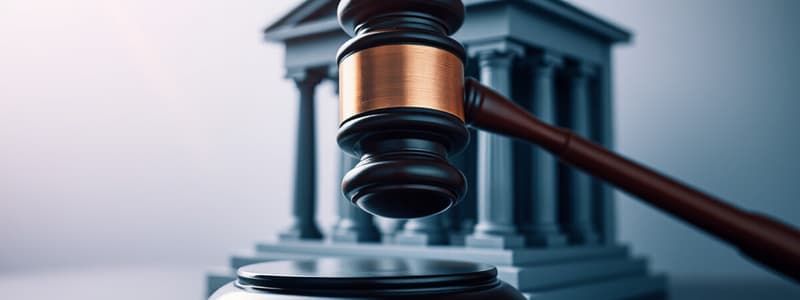Podcast
Questions and Answers
A person acts intentionally, or with intent, when it is his conscious objective or desire to engage in the ______ or cause the result.
A person acts intentionally, or with intent, when it is his conscious objective or desire to engage in the ______ or cause the result.
conduct
A person acts knowingly when he is aware of the nature of his ______ or that the circumstances exist.
A person acts knowingly when he is aware of the nature of his ______ or that the circumstances exist.
conduct
A person acts recklessly when he is aware of but consciously disregards a substantial and unjustifiable ______.
A person acts recklessly when he is aware of but consciously disregards a substantial and unjustifiable ______.
risk
Criminal negligence occurs when a person ought to be aware of a substantial and unjustifiable ______ that the circumstances exist.
Criminal negligence occurs when a person ought to be aware of a substantial and unjustifiable ______ that the circumstances exist.
A person is criminally responsible if the result would not have occurred but for his ______.
A person is criminally responsible if the result would not have occurred but for his ______.
A person is criminally responsible if the only difference between what actually occurred and what he ______ is that a different offense was committed.
A person is criminally responsible if the only difference between what actually occurred and what he ______ is that a different offense was committed.
A person is responsible for causing a result even if a different person or ______ was injured.
A person is responsible for causing a result even if a different person or ______ was injured.
A gross deviation from the standard of care that an ordinary person would exercise is indicative of ______ behavior.
A gross deviation from the standard of care that an ordinary person would exercise is indicative of ______ behavior.
A person commits an offense only if he voluntarily engages in ______, including an act, an omission, or possession.
A person commits an offense only if he voluntarily engages in ______, including an act, an omission, or possession.
Possession is a voluntary act if the possessor knowingly obtains or receives the thing possessed or is aware of his control of the thing for a sufficient time to permit him to ______ his control.
Possession is a voluntary act if the possessor knowingly obtains or receives the thing possessed or is aware of his control of the thing for a sufficient time to permit him to ______ his control.
A person who omits to perform an act does not commit an offense unless a law provides that the omission is an ______ or otherwise provides that he has a duty to perform the act.
A person who omits to perform an act does not commit an offense unless a law provides that the omission is an ______ or otherwise provides that he has a duty to perform the act.
A person does not commit an offense unless he ______, knowingly, recklessly, or with criminal negligence engages in conduct as the definition of the offense requires.
A person does not commit an offense unless he ______, knowingly, recklessly, or with criminal negligence engages in conduct as the definition of the offense requires.
If the definition of an offense does not prescribe a culpable mental state, a culpable mental state is nevertheless ______ unless the definition plainly dispenses with any mental element.
If the definition of an offense does not prescribe a culpable mental state, a culpable mental state is nevertheless ______ unless the definition plainly dispenses with any mental element.
Culpable mental states are classified according to relative degrees, from highest to ______, as follows: intentional, knowing, reckless, criminal negligence.
Culpable mental states are classified according to relative degrees, from highest to ______, as follows: intentional, knowing, reckless, criminal negligence.
Proof of a higher degree of ______ than that charged constitutes proof of the culpability charged.
Proof of a higher degree of ______ than that charged constitutes proof of the culpability charged.
An offense defined by municipal ordinance may not dispense with the requirement of a ______ mental state if the offense is punishable by a fine exceeding the amount authorized.
An offense defined by municipal ordinance may not dispense with the requirement of a ______ mental state if the offense is punishable by a fine exceeding the amount authorized.
Flashcards are hidden until you start studying
Study Notes
Requirement of Voluntary Act or Omission
- An offense occurs only if a person voluntarily engages in conduct, including acts, omissions, or possession.
- Possession is considered a voluntary act if the individual knowingly obtains or controls the item for enough time to terminate that control.
- An omission does not constitute an offense unless there is a law establishing a duty to act.
Requirement of Culpability
- A person commits an offense if they engage in conduct with intentional, knowing, reckless, or criminally negligent mental states.
- If an offense does not specify a culpable mental state, it is still required unless explicitly exempted.
- Criminal responsibility can be established with intent, knowledge, or recklessness if a mental state is required.
Definitions of Culpable Mental States
- Intentional: Conduct performed with a conscious objective or desire to achieve a result.
- Knowing: Awareness of the nature of conduct or that certain circumstances or results are likely to occur.
- Reckless: Awareness of and conscious disregard for a substantial risk; this conduct deviates from reasonable standards of care.
- Criminal Negligence: Failure to perceive a substantial and unjustifiable risk that constitutes a gross deviation from the expected standard of care.
Causation: Conduct and Results
- Criminal responsibility is established if the result would not have occurred but for the individual’s conduct, whether acting alone or with others, unless another cause was clearly sufficient.
- A person remains criminally responsible even if the desired outcome differs from the actual result, as long as the nature or victim of the harm changes.
Studying That Suits You
Use AI to generate personalized quizzes and flashcards to suit your learning preferences.




